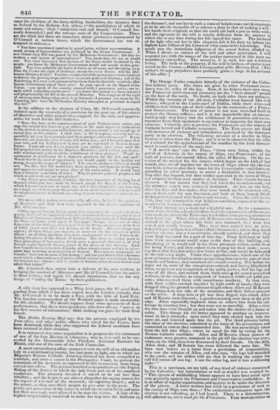A silly story has appeared in a Whig Irish paper,
the 11"eaArd Independent, from which it huts been copied into the London journals, that Mr. O'Connell is to be made a Peer, with the title of Lord Erin. The Lor,don correspondent of the Wexford paper is made answerable for this absurdity. We should suppose front sonic specimens of their performances, that these correspondents, who have always; "access to the first sources of information," think nothing too gross for their Irish friends.
The Dublin Evening Mail says that the persons employed by the Post-office, and other public offices, who voted for the Tories, have been dismissed, while they who supported the Liberal candidate have been retained in their situation.
It is rumoured that some negotiation is in progress for the retirement of one of the four Masters in Chancery ; who is, it is said, to be succeeded by the Honourable John Plunkett, Assistant Barrister for Meath, and one of the sons of the Irish Chancellor.
A most extraordinary affair, connected with the will of an old maiden lady in a neighbouring county, has just come to light, one in which her Majesty's Roman Catholic Attorney-General has been compelled to interfere, and enter a caveat in the Prerogative Court, to prevent the intentions of the testatrix, as expressed in this instrument, from being carried into effect. The persons involved as respondente are the Popish Bishop of the diocese in which the lady lived, and six of his surpliced coadjutors. The property involved is stated to be not less than 100,000/. ; and the bequests are almost altogether for saying masses for the repose of tie soul of the deceased; for repairing chapels ; and to the priests, as they muy think proper. to give altos to the poor. The priest: got possession of the house in which tile testatrix lived, and none but their own tool, were allowed to be near the victim. A lady of the highest respectability contrived to make her way into the bedroom of the deceasel, and saw her in such a state of helplessness and decrepitude as to be utterly incapable of so solemn a duty as that of making a Will: her hands were crippled, so that she could not hold a pen to write with; and the signature to the will is totally different from the manner in which she at any time during her life signed her name. The husband of the lady who saw her in this situation felt it his duty to inform the highest Law Officer of the Crown of what came to his knowledge. The result was the immediate lodgment of the caveat before alluded to. When I obtain an extract of the will and other particulars, I will acquaint you with the names of the parties concerned in this most ex_ traordinary proceeding. The testatrix, it is said, has not a relative living. The bulk of the property, if the will be broken, of course Inust revert to the Crown.—Dublin Correspondent of the Morning Post. ['file writer's Orange prejudices have probably given a tinge to his account of this affair.]


























 Previous page
Previous page